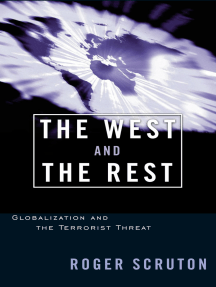승리한 전쟁 임진왜란 그 시작과 끝
오욱환 (지은이)조윤커뮤니케이션2022-10-31
승리한 전쟁 임진왜란 그 시작과 끝
정가
18,000원
판매가
18,000원 (0%, 0원 할인)
마일리지
멤버십(3~1%)
+ 5만원이상 구매시 2,000원
배송료
무료
수령예상일
지금 택배로 주문하면 5월 20일 출고
(중구 서소문로 89-31 기준) 지역변경
조선중기(임진왜란~경종) 주간 36위|Sales Point : 582
0.0 100자평(0)리뷰(0)
이 책 어때요?
카드/간편결제 할인무이자 할부소득공제 810원
수량
1
장바구니 담기
바로구매
선물하기
보관함 +
전자책 출간알림 신청중고 등록알림 신청중고로 팔기
기본정보
323쪽154*225mm420gISBN : 9791191779059
주제 분류
신간알리미 신청
국내도서 > 역사 > 조선사 > 조선중기(임진왜란~경종)
이벤트
5월 특별 선물. 키링 장바구니 · 책모양 정리함 (이벤트 도서 포함 국내서·외서 5만원 이상)
이 달의 적립금 혜택
책의 날. 나의 인생 네 권 공유하고 적립금 받기
함께 사면 무료배송. 1천원~4천원대 굿즈 총집합
이 시간, 알라딘 사은품 총집합!
책소개임진왜란은 당시까지 중국을 중심으로 한 동아시아 국제질서에 편입되어 있던 일본이, 당시의 보편적인 국제질서에 정면으로 도전한 사건임을 강조한다. 이러한 일본의 태도는 근대에 다시 나타나게 된다. 비록 두 번째의 시도도 1945년에 실패로 끝났지만, 한국과 중국에서는 여전히 일본에 대해 경계심을 늦추지 않고 있다.
그것은 임진왜란이나 태평양전쟁 후에 형성된 국제질서가 전쟁의 상흔을 치유하지 못하였고, 뇌리에 깊이 박혀 있는 상대국에 대한 인식에 근본적인 변화가 일어나지 않았기 때문이다. 저자는 그리하여 사소한 일이라도 생기게 되면 그때마다 아픈 상처가 덧나서 세 나라의 관계는 방향을 잡지 못하고 표류하게 되는 것이다고 전망한다.
목차
인사의 글
목차
프롤로그 --- 국제질서 재편의 기도
Ⅰ부. 정명을 기약하며
: 동아시아 국제질서에 대한 도전
1. 일본 열도의 평정
복속(服屬) 요구의 논리 / 류큐에 대한 정책 / 일본 열도의 평정 완료 /
조선왕조의 자리매김 / 조선 사절 알현
2. 「중국 진출」을 향하여
침공 체제 정비 / 국제 질서 재편의 기도 / 중국 진공의 시동
Ⅱ부. 「중국 진공」
1. 침공의 서전과 한성 함락
침공에 앞서 행한 조선과의 교섭 / 히데요시의 출진 / 조선의 국가와 사회 /
서전의 상황 / 선조의 몽진(蒙塵, 한성 이탈) / 조선 사회의 혼란 / 한성 함락 /
히데요시의 도해를 축으로 한 당초의 점령 정책 / 히데요시의 국가 확장 계획
2. 조선 팔도의 경략
일본 장수들의 팔도 분견 / 조선 관군의 최초의 승리 (양주전투, 해유령전첩) /
경상도 경략 / 전라도의 상황 - 금산(錦山, 웅치·이치)의 전투 /
충청도와 경기도의 상황 / 강원도의 경략 / 함경도 침공 / 오랑카이 침공 /
가토ㆍ나베시마 부대에 의한 함경도 경략 / 일본군의 평양 입성 /
조선 조정의 적극적인 전쟁지휘와 사족의 거병 / 조선의 반격과 명나라의 파병 /
제2차 평양성 전투 / 제3차 평양성 전투
3. 명·조선의 반격과 일본의 수세
조선 수군의 반격 / 히데요시의 도해 연기와 6월3일령 / 조선 의병의 궐기 /
조선 수군의 공세 / 6월3일령의 동결 / 명나라 군의 파병 / 북관대첩 / 진주대첩 /
히데요시의 딜레마 / 히데요시 도해계획의 재검토 / 히데요시의 도해와 친정을 둘러싸고
4. 전국(戰局)의 전환
제4차 평양성 전투 / 함경도의 정세 / 한성을 둘러싼 공방 – 벽제관전투, 행주대첩 /
한성에서의 군의와 가토·나베시마 부대의 합류 / 히데요시 도해 계획의 재연기와 군대의
재편 / 동국(東國)부대의 도해와 명·일의 교섭 재개 / 강화사 분작(扮作)과 일본군의 한성 철수
Ⅲ부. 강화 교섭과 그 파탄
1. 히데요시, 중국 진출을 단념하다.
명나라 사절을 받아들임 / 칙사 접견과 강화 조건의 제시 /
제2차 진주성 전투 / 진주성 함락후, 히데요시의 반응 / 전투의 결말
2. 일본군의 방비조치(조선 주둔) 체제
히데요시의 개선 계획과 선조의 한성 귀환 / 일본형 성채에 대하여 / 서해안 및 부산을 핵으로
하는 성채망 / 동해안의 성채군 / ‘소류큐’ ‘고산국’에 대한 입공 요구와 히데요시ㆍ히데츠구의
관계 / 선교사 세스페데스가 본 웅천성 / 휴전기의 조선 상황 / 일본 장병의 도망과 항왜 /
조선의 군량 문제 / 히데츠구의 출진계획
3. 강화교섭, 그리고 파탄
교섭을 향한 환경 정비 / ‘히데츠구 사건’ / 명ㆍ조선 사절의 來日 /
오사카 성에서의 사절 알현 / 교섭 결렬의 진짜 원인
Ⅳ부. 정유년의 재파병
: 정유재란 발발
1. 전라ㆍ충청도에의 침공
집요한 복속요구 / 재파병의 군편제 / 일본군의 도해와 제해권 / 이순신의 실각과 원균의
기용 / 작전에 실패하고 패전한 원균 : 거제도 칠천량 해전 / 일본군, 충청도와 전라도로
진격하다. / 남원성ㆍ황석산성 전투 / 이순신의 재기용, 명량해전 / 직산 회전 / 정읍의 軍議 /
시마즈 부대에 의한 전라도 해남 제압 / 일본의 ‘군정’과 조선사회 / 나베시마 부대에 의한
전라도 강진 지배 / 조선 사민(士民)의 구인 / 남방(濫妨)의 여러 가지 모습
2. 명나라ㆍ조선군의 반격
연안부의 성채 공사 / 울산 농성 / 울산의 공방 / 일본측 성채망의 재편 /
명나라ㆍ조선군의 재거(再擧)
3. 조선반도에 대한 고집(固執)
히데요시의 죽음과 최후의 화평공작 / 순천 전투 / 사천의 공성전 /
고니시 유키나가의 화평공작 / 노량해전 --- 조선반도에서의 전투의 종결
V부 국교 회복
: 새로운 국제 관계의 모색
1. 삼국간의 강화교섭
명군의 조선 주둔과 명·일 간의 교섭 / 강화와 철군을 향한 여러 가지 생각 /
일본의 국내 정국과 강화 교섭 / 명군의 철수 / 세키가하라 전투
2. 동아시아 국제질서의 재편
명ㆍ조선 관계와 쓰시마 ‘기미(羈縻)’론 / 명나라의 대조선·대일 전략과
조선 정부의 판단 / 조선과 쓰시마의 수호 회복 / 도쿠가와 정권의 대외 전략
에필로그 --- 비뚤어진 채로 적응하며 살아가기.
일본의 대명강화의 좌절 / 조선인 포로의 일본사회에의 동화
발문
참고문헌
연표
접기
저자 및 역자소개
오욱환 (지은이)
저자파일
신간알리미 신청
대한변호사협회의 사무총장과 서울변호사회의 회장으로 재직할 때, 일본과 관련한 회무는 사실상 그가 가장 좋아하는 업무였다. 변호사로서 민간 외교관 역할도 자청하였다. 일본 오사카 변호사회가 프랑스와의 협의를 위해, 서울변호사회와의 이미 합의한 행사를 축소하려는 움직임이 있던 때에는, 그 즉시 방일하여 계획을 변경하는 것이 적절하지 않음을 지적함으로써 당초 계획하였던 대로 행사를 진행하도록 한 적도 있었다고. 또한 일본 도쿄대대학원 법학정치학연구과 방문학자로 연구활동을 한 후, 도쿄대 야마시타 도모노부 교수의 주선으로 도쿄대 학생들을 대상으로 <한국의 사법제도의 개혁-형사사법제도를 중심으로>를 주제로 특강을 하기도 하고, 일본대동문화대학에서 동아시아 재판 외 분쟁해결기구의 필요성과 가능성을 주제로 강연하기도 하였다.
경기도 수원 출신으로 성균관대 법대를 졸업하고 법조계(사시 24회, 연수원 14기)에 입문했다. 대한변호사협회 공보이사, 대한변협 총무이사 겸 사무총장, 서울변호사회 회장 등을 역임하였고 국민권익위원회 자문위원, 중앙행정심판위원회 위원, 성균관대ㆍ한국외대ㆍ고려대 등에서 법학전문대학원과 법과대학에서 겸임 교수로 활동하였다. 현재 한양대학교 일본학국제비교연구소 객원연구원으로 연구 활동을 하고 있다. 저서로는 <격동, 메이지 유신 이야기>와 <승리한 전쟁 임진왜란 그 시작과 끝> <도쿠가와 이에야스 누구인가> <일본의 테러사> 등이 있다. 접기
최근작 : <일본의 테러사>,<태평양전쟁>,<도쿠가와 이에야스 누구인가> … 총 5종 (모두보기)
출판사 제공 책소개
동아시아 국제질서에 편입되어 있던 일본, 보편적인 국제질서에 정면으로 도전
다각적인 역사적 시각과 치밀한 고증을 통하여 밝혀낸 역사적 진실!
우리가 보통, 임진왜란을 이야기할 때는, 이순신 장군과 조선 수군의 이야기를 주로 하며, 그들이 이 나라를 수호하였다는 데에 논의가 집중된다. 그런데, 이 책은 ‘전쟁사’에 한정하여 다루지 않고, 「정치와 외교, 그리고 행정」에 관심을 두고, 그것도 전쟁의 입안자이자 침략자들의 입장에서, 그들이 이 전쟁을 어떠한 시각에서 어떤 명목으로 시작했고 어떻게 준비하고 어떻게 운용하였으며, 전쟁터에 나와 있는 장수들과 병사들은 어떠하였는가 등에 대해서도 폭넓게 제시한다.
이 책은 역사의 흐름과 서술의 용이함, 독자들의 이해를 돕기 위하여 시간의 흐름에 따라 얘기를 전개해 나가면서 이 전쟁이 궁극적으로는 조선이 승리한 전쟁이었음을 밝힌다. 조선이 아무런 전쟁 방비를 하지 않았던 것도 아니고, 오로지 수군에만 의지하여 나라를 지켜낸 것이 아니며, 관군이 무능했던 것도 아니고, 의병과 승병만으로 전쟁을 치른 것도 아니었기 때문이다. 특히 병농일치제와 국민개병제를 채택하여 백성이 곧 병사인 체제를 유지함으로써 관군과 의병이 별개의 것이 아니고 그 병력의 규합과 동원 및 조직의 통합과 지휘체계가 유연하게 작동하고 있었다는 점을 부각한다. 또한, 일단 유사시 지방군을 한곳에 모아 중앙군에 편입하여 전투를 벌이는 제승방략체제 하에서 선조 임금을 중심으로 모든 백성들이 한마음 한뜻으로 나라를 지켜냈음을 소개한다.
저자는 늘 임진왜란을 논할 때마다, 풀리지 않는 의문점이나 궁금한 점들이 많았다고 밝힌다. 이순신과 조선수군ㆍ의병ㆍ민초들 만으로, 백 년간의 전란을 겪으며, 양성된 무사를 중심으로 하여 구성된 일본의 침략을 이겨 낼 수 있었을까 하는 점이었다. 또 하나는 일본은, 조선을 침략할 때, 무엇을, 얼마나, 어떻게 준비하고, 이를 전장에서 어떻게 실행에 옮겼을까 하는 것이었다. 또, 전쟁의 휴지기에 즉, 임진왜란과 정유재란 사이에는 어떤 일들이 있었을까, 그리고 전쟁은 어떻게 마무리되었을까 하는 것들이다.
이 책은 그러한 점들에 대한 고민을 풀어나가는 학습의 과정이라고 볼 수 있다. 그리고 그 과정을 통해 필자가 알게 된 역사적 사항들에 대해서 궁금증을 해소하는 차원에서 접근한다. 이 책은 임진왜란의 원인을 규명하면서 한·중·일 동북아 3국의 국제 정세도 진단한다.
임진왜란은 당시까지 중국을 중심으로 한 동아시아 국제질서에 편입되어 있던 일본이, 당시의 보편적인 국제질서에 정면으로 도전한 사건임을 강조한다. 이러한 일본의 태도는 근대에 다시 나타나게 된다. 비록 두 번째의 시도도 1945년에 실패로 끝났지만, 한국과 중국에서는 여전히 일본에 대해 경계심을 늦추지 않고 있다. 그것은 임진왜란이나 태평양전쟁 후에 형성된 국제질서가 전쟁의 상흔을 치유하지 못하였고, 뇌리에 깊이 박혀 있는 상대국에 대한 인식에 근본적인 변화가 일어나지 않았기 때문이다. 저자는 그리하여 사소한 일이라도 생기게 되면 그때마다 아픈 상처가 덧나서 세 나라의 관계는 방향을 잡지 못하고 표류하게 되는 것이다고 전망한다. 접기











